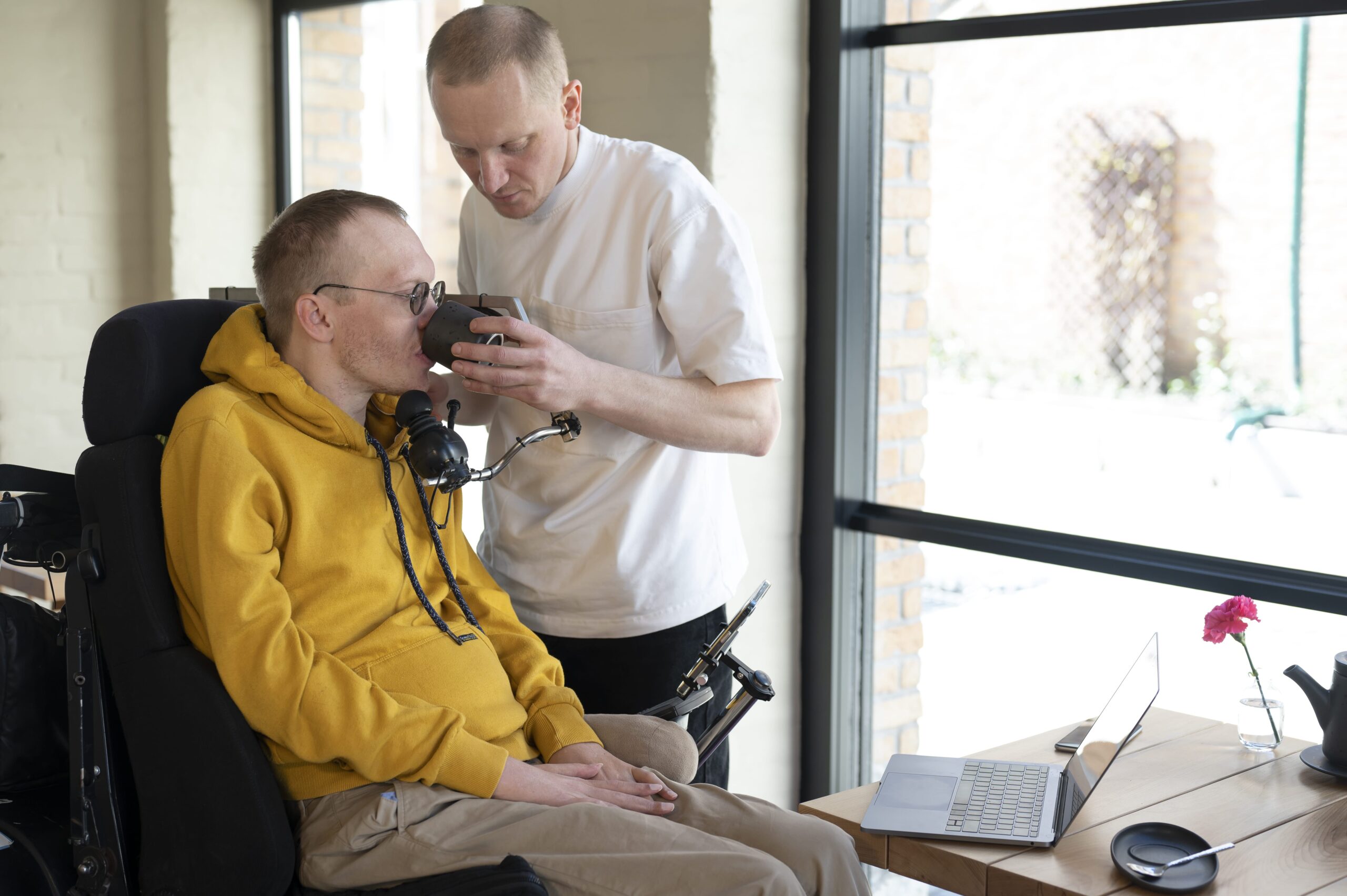Did you know that every 3 seconds, someone in the world develops dementia? That’s right – by the time you finish reading this introduction, about 20 people will have joined this unique club. With over 55 million people worldwide living with dementia, chances are you know someone affected by it, even if you don’t realise it yet.
In this guide, we’ll explore the different types of dementia and discover how they uniquely shape a person’s world. If you’re worried about your loved one, curious about your brain health, or want to understand this condition better, you’re in the right place.
By the end of this, you’ll see dementia in a whole new light – and you might just be surprised by what you learn about yourself along the way.
What Are The Different Types of Dementia?
Alzheimer’s Disease
Alzheimer’s disease is the most common form of dementia, accounting for 60-80% of cases. It is characterised by the buildup of abnormal proteins (beta-amyloid plaques and tau tangles) in the brain, leading to brain cell death.
Symptoms of Alzheimer’s disease include:
- Memory loss that disrupts daily life.
- Difficulty planning or solving problems.
- Trouble completing familiar tasks.
- Confusion with time or place.
- Problems with visual perception.
- New problems with words in speaking or writing.
- Misplacing things and losing the ability to retrace steps.
- Decreased or poor judgement.
- Withdrawal from work or social activities.
- Changes in mood and personality.
The exact cause of Alzheimer’s disease is unknown, but researchers believe it results from a combination of genetic, environmental, and lifestyle factors. Age is the most significant risk factor, with the likelihood of developing Alzheimer’s doubling every five years after age 65.
Also read: What is the difference between Dementia and Alzheimer’s?
Vascular Dementia
Vascular dementia is the second most common type of dementia, accounting for about 10% of cases. It occurs when there is reduced blood flow to the brain, often due to a series of small strokes or other blood vessel problems. This lack of blood flow can damage and eventually kill brain cells, leading to cognitive decline.
Symptoms of Vascular Dementia include:
- Confusion and disorientation.
- Trouble speaking or understanding speech.
- Vision loss.
- Difficulty with motor skills and balance.
- Problems with memory.
- Mood changes, including depression or apathy.
Dementia with Lewy Bodies (DLB)
Lewy body dementia is characterised by abnormal protein deposits called Lewy bodies in the brain. This type of dementia shares similarities with both Alzheimer’s and Parkinson’s diseases, making it challenging to diagnose.
Symptoms of Lewy body dementia are:
- Fluctuating cognition with variations in attention and alertness.
- Recurrent visual hallucinations.
- Parkinsonian motor symptoms, such as rigidity and tremors.
- REM sleep behaviour disorder.
- Sensitivity to antipsychotic medications.
People with DLB may also experience depression, anxiety, and problems with autonomic body functions, such as blood pressure control, temperature regulation, and bladder and bowel function.
Also Read: Most Frequently Asked Questions about Dementia
Frontotemporal Dementia (FTD)
Frontotemporal dementia, also known as Pick’s disease, is a group of disorders caused by progressive nerve cell loss in the brain’s frontal and temporal lobes. This type of dementia tends to occur at a younger age than Alzheimer’s disease, often between the ages of 45 and 65.
There are three main types of FTD:
- Behavioural variant FTD: Characterised by changes in personality and behaviour.
- Primary progressive aphasia: Affects language skills.
- Movement disorders: Causes problems with movement, including corticobasal syndrome and progressive supranuclear palsy.
Symptoms of Frontotemporal dementia include:
- Dramatic changes in personality and behaviour.
- Difficulty with language (speaking, understanding, reading, or writing).
- Lack of inhibition and social awareness.
- Apathy or emotional blunting.
- Compulsive or repetitive behaviours.
- Difficulty with executive functions like planning and organising.
As we continue exploring the types of dementia, it’s important to note that each presents unique challenges and requires specialised care approaches.
Concerned about the early signs of dementia? Request a free in-home companion care assessment to understand how we can support you or your loved one.
Mixed Dementia
Mixed dementia occurs when a person has more than one type of dementia simultaneously. The most common combination is Alzheimer’s disease and vascular dementia, but other combinations are possible. Research suggests that mixed dementia may be more common than previously thought, especially in older individuals.
Symptoms of mixed dementia can vary depending on the types of brain changes involved and the brain regions affected. They may resemble those of Alzheimer’s or another type of dementia. In many cases, symptoms may be similar to or even indistinguishable from Alzheimer’s disease.
The complexity of mixed dementia underscores the importance of comprehensive diagnostic approaches and personalised treatment strategies.
Creutzfeldt-Jakob Disease
Creutzfeldt-Jakob disease (CJD) is a rare, rapidly progressive, and fatal brain disorder. It belongs to a family of human and animal diseases known as Transmissible Spongiform Encephalopathies (TSEs) or prion diseases. CJD is caused by abnormally folded proteins called prions, which trigger a chain reaction of protein misfolding in the brain, leading to brain damage.
Symptoms of CJD typically include:
- Rapid cognitive decline
- Memory problems
- Personality changes
- Hallucinations
- Impaired vision
- Impaired coordination
- Involuntary movements
CJD progresses much more rapidly than other types of dementia, often leading to death within a year of symptom onset.
What is the most aggressive form of dementia?
The most aggressive form of dementia is Creutzfeldt-Jakob Disease (CJD). CJD is a rare and rapidly progressing neurodegenerative disorder that leads to severe cognitive decline, memory loss, and neurological symptoms.
HIV-Associated Dementia
Human Immunodeficiency Virus (HIV)-associated dementia, also known as AIDS dementia complex, is a form of dementia that can occur in people with HIV/AIDS. It typically develops in the later stages of HIV infection when the virus has significantly weakened the immune system and entered the brain.
Symptoms of HIV-associated dementia may include:
- Memory problems
- Difficulty concentrating
- Slowed thinking
- Motor problems, such as clumsiness or poor balance
- behavioural changes, including apathy or depression
With the advent of Highly Active Antiretroviral Therapy (HAART), the incidence of HIV-associated dementia has decreased significantly. However, milder forms of cognitive impairment related to HIV remain a concern.
Dementia Caused by Huntington’s Disease
Huntington’s disease is an inherited disorder caused by a faulty gene that causes damage to specific areas of the brain. While it primarily affects movement, it can also lead to cognitive decline and dementia.
Symptoms of Huntington’s disease dementia may include:
- Difficulty focusing and concentrating.
- Memory problems.
- Impaired judgement.
- Mood changes, including depression and anxiety.
- Difficulty with speech and swallowing.
- Involuntary movements (chorea).
The cognitive symptoms of Huntington’s disease typically appear gradually and progress over time, often alongside the characteristic movement disorders associated with the condition.
Younger-Onset Dementia
While dementia is often associated with old age, it can also affect individuals under the age of 65. This is known as younger-onset dementia or early-onset dementia. Any dementia can occur as younger-onset dementia, but certain types are more common in younger people.
Younger-onset dementia presents unique challenges, as it often affects individuals who are still working, raising families, and have significant financial responsibilities. Early diagnosis and support are crucial for helping these individuals and their families navigate the complex journey ahead.
If you or someone you care about is showing signs of dementia, contact us for compassionate in-home support tailored to your needs.
Alcohol-Related Brain Injury (ARBI)
Chronic alcohol abuse can lead to various forms of alcohol-related brain injury (ARBI), including a type of dementia known as alcohol-related dementia. This condition results from the neurotoxic effects of alcohol on the brain, as well as the nutritional deficiencies often associated with long-term alcohol abuse.
Symptoms of alcohol-related dementia may include:
- Problems with memory, especially short-term memory.
- Difficulty with planning and organising.
- Poor judgement and impaired decision-making.
- Personality changes.
- Decreased attention span.
- Problems with balance and coordination.
Unlike other forms of dementia, alcohol-related brain injury may be partially reversible if the individual stops drinking and maintains good nutrition. However, some degree of cognitive impairment may persist.
Korsakoff Syndrome
Korsakoff syndrome is a chronic memory disorder caused by severe thiamine (vitamin B1) deficiency. It is most commonly associated with alcohol misuse but can also occur due to severe malnutrition or other conditions that lead to thiamine deficiency.
Critical features of Korsakoff syndrome include:
- Severe short-term memory loss.
- Difficulty forming new memories.
- Confabulation (making up stories to fill memory gaps).
- Lack of insight into the condition.
- Personality changes.
Korsakoff syndrome is often preceded by a temporary neurological disorder called Wernicke encephalopathy. When these two conditions occur together, the term Wernicke-Korsakoff syndrome is used.
Read our blog: Tips for Caring for a Parent or Loved One with Dementia at Home
Each type of dementia requires unique care. Schedule a consultation with our in-home care experts to find out how we can provide the proper support for your situation.
What Is Dementia?
Dementia is an umbrella term used to describe various cognitive disorders characterised by a decline in memory, reasoning, and other cognitive functions that significantly impact daily life. It’s not a single disease but rather a general term covering a wide range of specific medical conditions.
Dementia involves a group of symptoms that severely affect memory, thinking, and social abilities and interfere with daily functioning. Alterations in mood, behaviour, and personality often accompany these cognitive changes.
What Are The Causes of Dementia?
A single factor doesn’t cause dementia – it’s more like a perfect storm of various elements coming together. The primary cause is damage to brain cells, which can happen due to:
- Age-related changes: As we get older, our brains naturally shrink and work less efficiently.
- Genetic factors: Some types of dementia, like Alzheimer’s, can run in families.
- Lifestyle and environmental factors: Things like high blood pressure, smoking, excessive alcohol consumption, and lack of physical activity can increase the risk.
- Brain injuries: Severe or repeated head injuries can lead to certain types of dementia.
- Diseases and infections: Conditions like Parkinson’s disease, HIV, and certain types of infections can cause damage leading to dementia.
Remember, having one or more of these risk factors does not guarantee you will get dementia. It’s a complicated interaction of factors, many of which are currently being studied.
How Does Dementia Differ from Normal Ageing?
As people age, they are expected to experience minor memory lapses, such as forgetting names or misplacing items. However, these lapses are generally mild and do not interfere with daily life. In contrast, dementia involves a more significant and persistent decline in cognitive abilities.
Key Differences:
- Memory Loss: In normal ageing, occasional forgetfulness does not significantly impact daily life. In dementia, memory loss is more severe and persistent, often making it difficult to recall recent events, recognise familiar people, or remember how to perform simple tasks.
- Cognitive Decline: Ageing may slow cognitive processing, but it does not cause the severe cognitive impairment seen in dementia. Dementia impairs intellect, judgement, and problem-solving ability, often resulting in poor decisions and confusion.
- Functional Impact: Normal ageing may lead to slower reaction times or difficulties with multitasking, but these changes do not prevent individuals from managing their daily lives. Dementia, however, can cause significant problems in carrying out everyday activities, such as cooking, managing finances, or maintaining personal hygiene.
What Are The Common Symptoms of Dementia?
While the symptoms of dementia can vary depending on the type, some common signs are often present across different forms of the condition. Recognising these early signs and symptoms of dementia can lead to a timely diagnosis and better management of the condition. Common dementia symptoms include:
- Memory Loss: This is often one of the earliest and most recognisable symptoms. It usually starts with forgetting recent events or conversations and can progress to forgetting names, faces, and important dates.
- Difficulty with Communication: Individuals with dementia may struggle to find the right words, follow conversations, or understand what others are saying.
- Impaired Reasoning and Judgement: Dementia affects the ability to make sound decisions and solve problems. This can lead to risky behaviours, poor financial decisions, or unsafe driving.
- Disorientation: People with dementia may become confused about the time, place, or even their identity. They might forget where they are or how they got there.
- Changes in Mood and Behaviour: Depression, anxiety, paranoia, and agitation are common emotional responses to the frustration and confusion caused by cognitive decline.
- Difficulty with Daily Tasks: As dementia progresses, it can become increasingly difficult to perform routine activities such as dressing, bathing, and eating.
How does dementia affect a person?
Dementia affects a person by gradually impairing their cognitive functions, such as memory, thinking, and reasoning. As the condition progresses, individuals may struggle with daily tasks, experience confusion, have difficulty communicating, and exhibit changes in behaviour and mood. Over time, dementia can lead to significant memory loss, difficulty recognising loved ones, and a decline in the ability to care for oneself, making continuous support and care essential.
Conclusion
Caring for someone with dementia requires patience, flexibility, and a sound support system. From creating a safe environment to managing daily tasks and dealing with behavioural changes, there’s a lot to consider.
Understanding the different types of dementia is essential for early detection, proper care, and potential treatment strategies. While each type of dementia presents unique challenges, they all significantly impact the lives of those affected and their loved ones.
Recognising these symptoms early is crucial for effective management and care. If you or someone you love is showing signs of dementia, contact us today for personalised care and support tailored to your unique needs.



